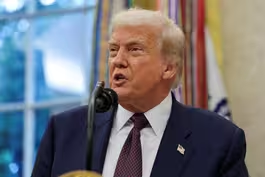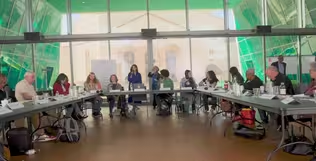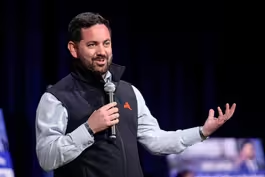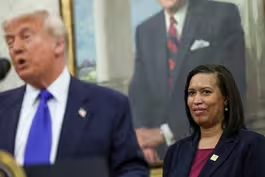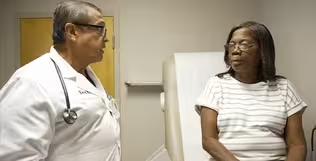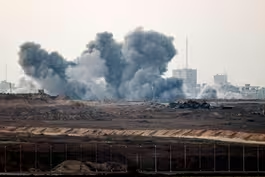
Mideast experts analyze risks as Israel considers occupation
Clip: 8/7/2025 | 9m 46sVideo has Closed Captions
Mideast experts analyze consequences as Israel considers full Gaza occupation
The Israeli cabinet is in a marathon session debating whether or not to completely reoccupy the Gaza Strip militarily. For two perspectives, Geoff Bennett spoke with David Makovsky of the Washington Institute for Near East Policy's Project on Arab-Israeli Relations and Yousef Munayyer of the Palestine-Israel Program and Senior Fellow at the Arab Center.
Problems playing video? | Closed Captioning Feedback
Problems playing video? | Closed Captioning Feedback
Major corporate funding for the PBS News Hour is provided by BDO, BNSF, Consumer Cellular, American Cruise Lines, and Raymond James. Funding for the PBS NewsHour Weekend is provided by...

Mideast experts analyze risks as Israel considers occupation
Clip: 8/7/2025 | 9m 46sVideo has Closed Captions
The Israeli cabinet is in a marathon session debating whether or not to completely reoccupy the Gaza Strip militarily. For two perspectives, Geoff Bennett spoke with David Makovsky of the Washington Institute for Near East Policy's Project on Arab-Israeli Relations and Yousef Munayyer of the Palestine-Israel Program and Senior Fellow at the Arab Center.
Problems playing video? | Closed Captioning Feedback
How to Watch PBS News Hour
PBS News Hour is available to stream on pbs.org and the free PBS App, available on iPhone, Apple TV, Android TV, Android smartphones, Amazon Fire TV, Amazon Fire Tablet, Roku, Samsung Smart TV, and Vizio.
Providing Support for PBS.org
Learn Moreabout PBS online sponsorshipGEOFF BENNETT: We're shifting our focus now back# to the latest news in the Israel-Hamas war.
The## Israeli Cabinet is in a marathon session# still meeting after 1:00 a.m. local time## debating whether or not to completely# reoccupy the Gaza Strip militarily.
For perspective on this, we get two views, David# Makovsky, the director of the Washington Institute## for Near East Policy's Project on Arab-Israel# Relations.
And Yousef Munayyer is the head## of the Palestine/Israel Program and senior# fellow at the Arab Center in Washington, D.C.
Thank you both for being with us.
David, I will start with you.
Do you see this notion of Israel completely# re.. military strategy, or is this a political# tactic to pressure Hamas into cease-fire talks?
DAVID MAKOVSKY, Senior Fellow, Washington# Institute for Near East Policy: We don't## know for sure.
I thi.. if you look at all the news reporting, it's# been kind of scaled down in the last 24 hours.
Instead of this idea of a blitz through the# -- these remaining cities that were going for## five months, they're now talking about dropping# leaflets and then maybe encircling the city and## then doing raids in and out.
But there's clearly# differences between the prime minister and the## chief of staff.
The military chief of staff of the# IDF wants to go slower and does not want to go in.
He's worried the hostages will die.
He's# worried soldiers will get killed.
He's worried## that innocent people in Gaza will be killed.# So -- but I think the prime minister has set## out such an ambitious goal that you wonder# that what could start as a political ploy,## if it doesn't go the way he wants to# pressure Hamas to come back to the table,## might have a dynamic of its# own.
We just don't know yet.
GEOFF BENNETT: Yousef, how do you see it?
And when# Israeli officials talk about a full occupation,## what exactly does that mean on# the ground in practical terms?
YOUSEF MUNAYYER, Arab Center# Washington, D.C.: Right.
I think it's important to understand that ri.. in its entirety, but on the ground it controls# something like 75 to 80 percent of the territory.## And over the course of its operations, it has# increasingly pushed the civilian population in## Gaza into these concentrated areas now,# which make up a tiny space of the land.
So what they're considering now, what# they're talking about is actually the## military going into those spaces.
And as# we witnessed over the last couple of years,## credible accusations of war crimes# and mass atrocities throughout the## course of these campaigns, this would# foreshadow the bloodiest stage of the## campaign yet against the population in Gaza# if the military was to go in to these densely,## densely populated areas, because that's all that# is left that the population has to retreat to.
So if they do in fact go ahead with this, it# would be, as I said, a bloody, bloody moment## at a time where there is global outrage over# this war that has already reached a fever pitch.
GEOFF BENNETT: And, David, if the# Netanyahu government's actions## are aimed at pressuring Hamas to make# concessions at the negotiating table,## what have been the major sticking# points in the talks so far?
A few weeks ago, there were reports# that the two sides were close to a deal.## What happened and what would need to change now?
DAVID MAKOVSKY: Yes, no, really good# questions.
And I agree with Yousef that,## if there would be fighting in densely# urban areas, it becomes very bloody.
And that's why the IDF chief of staff does not# want that and would like Israel to stay outside of## the cities.
But I think there was a feeling that# you were getting close under the Steve Witkoff,## President Trump's envoy's formula# of half the hostages getting out in## return for a certain ratio of lifetime# prisoners of Hamas being released.
And let's remember that Yahya Sinwar, the# mastermind of October 7, was released in## a very lopsided deal in -- with Gilad Shalit in# 2011.
But still there was a feeling, OK, they're## moving towards each other.
And then it seemed that# Hamas hardened their position and said, no, we're## not doing this deal the way we said, we will not# disarm until after we have a state in Jerusalem.
And this is coming at the very time# that the Arab states, the Arab League,## and for the first time really# called out Hamas publicly and said,## they have to disarm and they cannot govern# Gaza.
It should be the Palestinian Authority.
And so I think this was an important# breakthrough.
I didn't think it got## a lot of attention here because of the tariffs# maybe or other issues, but that the Arab states## were publicly calling out Hamas, saying# they shouldn't rule Gaza, is an important## moment.
And I think it was moving towards each# other, and then Hamas hardened their position.
The prime minister -- I know from people who've# talked to the prime minister said that he feels## they hardened their position because of# this conference of Macron, of France,## or whatever.
It doesn't matter.
But the point# is, is that he's under a lot of pressure now And you had that relative of Evyatar# David on the show the other day,## and with the pictures of him looking like he came# out of Auschwitz or something from the Holocaust,## and the public wants these hostages# home.
So he's feeling a lot of heat,## and he just said, well, the negotiations aren't# working.
We have got to try something new.
But you have got to be careful,# what is the alternative to that too?
GEOFF BENNETT: And, Yousef, how should# we understand Hamas' staying power after## nearly two years of war, widespread# destruction, so on and so forth?
YOUSEF MUNAYYER: Well, I think the primary# issue has been that -- in these negotiations,## that the Palestinians have wanted to# see an end to this war.
And there has## been a cease-fire in place.
That# was the case in early January.
But it was something that the Israeli government# decided to back out of because they believed they## could increase pressure on the Palestinians, and# Hamas, in particular, and try to get a better set## of terms.
That didn't materialize, despite all# of the pressure that we have seen, the massive## Israeli military operation that expanded its# control to some 75 to 80 percent of the territory,## the deliberate starvation campaign that has# made headlines around the world in recent weeks.
That has failed to create change at the# negotiating table.
And I think one thing that the## Israeli public is increasingly understanding is,# of all of the hostages that have been released,## the vast majority of them have been released# in negotiations, and not by military force.
I think the key problem right now is that# what people are realizing is that the goals## set forth by the Israeli government in# this war, these three different goals,## they're beginning to militate against each# other as push comes to shove on the ground.
And## Netanyahu is looking for answers from the military# that they simply cannot provide right now.
And he's looking at an Israeli public# who wants an end to this as well,## but a Cabinet and a government who is not# really letting him back away from this.## So he may very well walk himself into# even greater horrors in Gaza because he## doesn't seem to have a clear vision and# doesn't seem to have a clear strategy,## other than continuing to use the blunt# force of the military against Palestinians.
GEOFF BENNETT: In the time that remains,## let's talk about the U.S. role.
What role does# the .. President Trump is sending mixed signals.# The Biden administration largely deferred to## Israel's approach.
Is meaningful American# pressure even on the table right now?
DAVID MAKOVSKY: No, I think that# you're raising an important point.
And I actually think the interview that Netanyahu# gave today, he doesn't talk to the Israeli media,## but he talks to the American media.# Today, it was FOX News.
But it was the## most explicit he's come in saying# that this is like -- basically,## this -- Gaza's going to be given over to# other Arabs.
It can't be run by Hamas.
And I would hold him to it.
And now that you have# that Arab statement that I was referring to from## last week calling out Hamas, saying they can't# govern, I would hope us in Washington, that the## United States would come to Netanyahu and say, OK,# you said that it's going to be other Arabs taking## over; 74 percent of Israelis, including 60 percent# of your own supporters in the last Channel 12 --## that's like the leading TV -- in last Friday poll# would rather get the hostages out and end the war.
So let's think about, how do we make that segue,# that other Arabs can do that and do it in a way## that Hamas is not left holding guns?
Because, in# the Middle East, the people who fire the shots## call the shots.
But if the Arabs are willing# to take this area over, I would hope the United## States would work with Israel here and the Arabs# in making that transition, because Netanyahu was## saying, it's not going to be annexed by Israel,# even though the hard right wants him to do that.
But he has not done that.
GEOFF BENNETT: Yousef, in the 45# seconds we have left, what's your view?
YOUSEF MUNAYYER: Look, at the end of# the day, Gaza is occupied by Israel.## The population there is Israel's responsibility.# They have completely destroyed the area in Gaza.
Why Netanyahu thinks he can pass off that# issue to any other country, Arab or otherwise,## is beyond me.
He's writing checks at this point# that he simply can't cash.
And, unfortunately,## Washington is allowing him to meander down this# very, very destructive road with no way out.
GEOFF BENNETT: Yousef Munayyer and# David Makovsky, our thanks to you both.
As tariffs kick in, economist flags recession warning signs
Video has Closed Captions
Clip: 8/7/2025 | 5m 44s | As Trump's tariffs kick in, economist breaks down inflation and recession warning signs (5m 44s)
A Brief But Spectacular take on intergenerational community
Video has Closed Captions
Clip: 8/7/2025 | 4m 3s | A Brief But Spectacular take on the power of intergenerational communities (4m 3s)
GOP Rep. Lawler calls for redistricting battles to end
Video has Closed Captions
Clip: 8/7/2025 | 5m 55s | 'Mutually assured destruction': GOP Rep. Lawler calls for redistricting battles to end (5m 55s)
A look at Trump's legal power as he threatens DC takeover
Video has Closed Captions
Clip: 8/7/2025 | 6m 3s | A look at Trump's legal authority over DC as he threatens federal takeover (6m 3s)
Medicaid reliance places Louisiana on frontlines of cuts
Video has Closed Captions
Clip: 8/7/2025 | 5m 23s | Louisiana’s high Medicaid reliance places state on frontlines of health care cuts (5m 23s)
New book 'Joy Goddess' reveals A’Lelia Walker's influence
Video has Closed Captions
Clip: 8/7/2025 | 8m 37s | New book 'Joy Goddess' reveals how A’Lelia Walker helped shape the Harlem Renaissance (8m 37s)
News Wrap: Netanyahu aims to reoccupy all of Gaza militarily
Video has Closed Captions
Clip: 8/7/2025 | 7m | News Wrap: Netanyahu says Israel aims to reoccupy all of Gaza militarily (7m)
Providing Support for PBS.org
Learn Moreabout PBS online sponsorshipSupport for PBS provided by:
Major corporate funding for the PBS News Hour is provided by BDO, BNSF, Consumer Cellular, American Cruise Lines, and Raymond James. Funding for the PBS NewsHour Weekend is provided by...
